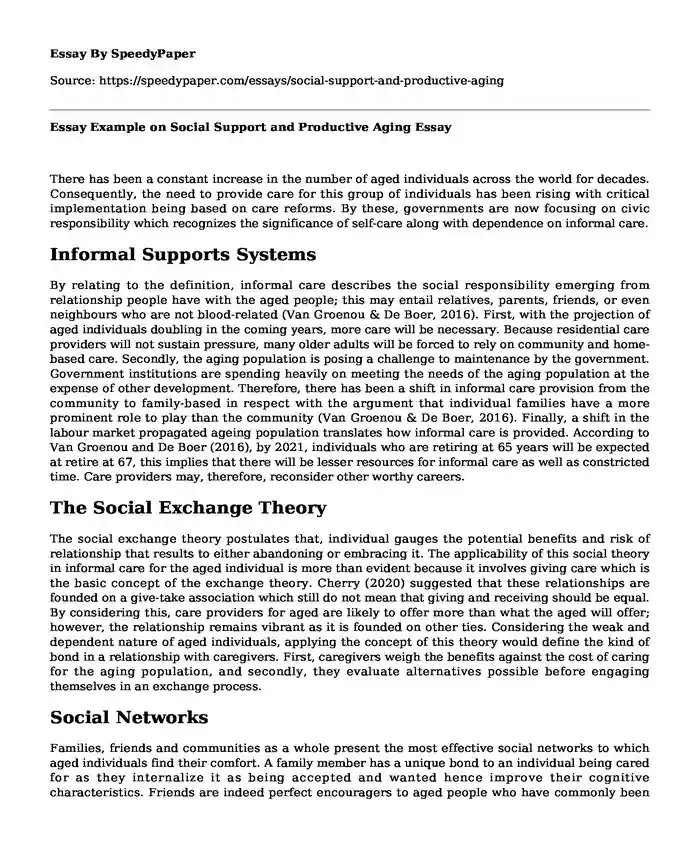
| Essay type: | Problem solution essays |
| Categories: | Problem solving Population Human services Social issue Essays by pagecount |
| Pages: | 3 |
| Wordcount: | 687 words |
There has been a constant increase in the number of aged individuals across the world for decades. Consequently, the need to provide care for this group of individuals has been rising with critical implementation being based on care reforms. By these, governments are now focusing on civic responsibility which recognizes the significance of self-care along with dependence on informal care.
Informal Supports Systems
By relating to the definition, informal care describes the social responsibility emerging from relationship people have with the aged people; this may entail relatives, parents, friends, or even neighbours who are not blood-related (Van Groenou & De Boer, 2016). First, with the projection of aged individuals doubling in the coming years, more care will be necessary. Because residential care providers will not sustain pressure, many older adults will be forced to rely on community and home-based care. Secondly, the aging population is posing a challenge to maintenance by the government. Government institutions are spending heavily on meeting the needs of the aging population at the expense of other development. Therefore, there has been a shift in informal care provision from the community to family-based in respect with the argument that individual families have a more prominent role to play than the community (Van Groenou & De Boer, 2016). Finally, a shift in the labour market propagated ageing population translates how informal care is provided. According to Van Groenou and De Boer (2016), by 2021, individuals who are retiring at 65 years will be expected at retire at 67, this implies that there will be lesser resources for informal care as well as constricted time. Care providers may, therefore, reconsider other worthy careers.
The Social Exchange Theory
The social exchange theory postulates that, individual gauges the potential benefits and risk of relationship that results to either abandoning or embracing it. The applicability of this social theory in informal care for the aged individual is more than evident because it involves giving care which is the basic concept of the exchange theory. Cherry (2020) suggested that these relationships are founded on a give-take association which still do not mean that giving and receiving should be equal. By considering this, care providers for aged are likely to offer more than what the aged will offer; however, the relationship remains vibrant as it is founded on other ties. Considering the weak and dependent nature of aged individuals, applying the concept of this theory would define the kind of bond in a relationship with caregivers. First, caregivers weigh the benefits against the cost of caring for the aging population, and secondly, they evaluate alternatives possible before engaging themselves in an exchange process.
Social Networks
Families, friends and communities as a whole present the most effective social networks to which aged individuals find their comfort. A family member has a unique bond to an individual being cared for as they internalize it as being accepted and wanted hence improve their cognitive characteristics. Friends are indeed perfect encouragers to aged people who have commonly been defined by chronic conditions. They motivate by sharing out ideas and relate their conditions to each other as most of their friends are likely to be of the same age and therefore faced by similar events. The community plays the most significant role, by accepting that ageing is natural, it can put necessary interventions in preparation for the same.
Productive Aging
According to my understanding, productive ageing refers to the peculiar nature of the aged person to accept whoever they are and make positive moves about their life. These may include, contributing to community projects, upholding self-health, and participating in activities others are being involved. Older people may have a judgmental feeling of being a burden posing less benefit to the caregivers than the benefit they offer; therefore, they may try to make at least efforts to change these perceptions hence engage positively in the society.
References
Van Groenou, M. I. B., & De Boer, A. (2016). Providing informal care in a changing society. European Journal of Ageing, 13(3), 271-279. https://link.springer.com/article/10.1007/s10433-016-0370-7
Cherry, K. (2020). How social exchange theory is used: How it influences relationships. Social psychology. https://www.verywellmind.com/what-is-social-exchange-theory-2795882
Cite this page
Essay Example on Social Support and Productive Aging. (2023, Sep 10). Retrieved from https://speedypaper.com/essays/social-support-and-productive-aging
Request Removal
If you are the original author of this essay and no longer wish to have it published on the SpeedyPaper website, please click below to request its removal:
- Essay Example: Critique of a Quantitative Nursing Research Report
- Communication between doctor and patient
- Education Essay Example: Individualized Education Plan for Dillion
- Essay Sample on Organizational Leadership Aspects
- Free Essay. Impact of Low-Interest Rate Environment on the Time Value of Money
- Essay Sample on Effects of Divorce on Mothers
- Essay Sample on a Contemporary Healthcare Issue
Popular categories




